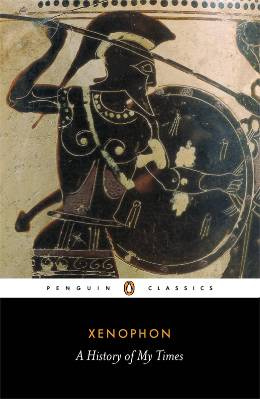BOOK I
Chapter 1
To Darius and Parysatis were born two sons, the older Artaxerxes and the younger Cyrus. And he believed this and had Cyrus seized, so that he might put him to death. Their mother, however, interceded and sent him back again to his province.
(4) After he departed, having been in danger and dishonored, Cyrus began planning how he would avoid being subject to his brother ever again but rather, if he were able, would rule as King instead of him. Parysatis, their mother, was on the side of Cyrus, for she loved him more than the ruling King, Artaxerxes. (5) And, as for those who came to him from the King, with him, he took care that they would be capable of making war and would also be well disposed to him. (6) He went about assembling his Greek force as secretly as he could, in order that he might catch the King as unprepared as possible.
This is how he carried out this collection of troops: he passed the word to the garrison commanders of all the garrisons he had in the cities to secure men from the Peloponnese as numerous and as good as possible, on the grounds that Tissaphernes was plotting against their cities. For the Ionian cities had anciently belonged to Tissaphernes, having been given to him by the King, but at that time they all had revolted to Cyrus, except for Miletus. (7) In Miletus, Tissaphernes perceived in advance those who were planning to do the sameto revolt to Cyrusand he killed some of them and banished others. But Cyrus took up the exiles and brought an army together, and besieged Miletus by both land and sea, and he was trying to restore the exiles. And this, then, was another of his pretexts for assembling an army. (8) He sent to the King and claimed that, since he was his brother, these cities should be given to him rather than be ruled by Tissaphernes, and his mother assisted him on this. As a result, the King did not perceive the plot against himself but believed that Cyrus was spending on armies because he was at war with Tissaphernes. As a result, he was not the least bit vexed that they were at war, for Cyrus also sent to the King the tribute that arose from the cities of Tissaphernes that he happened to hold.
(9) Another army was being collected for him in the Chersonese, opposite Abydus, in the following manner. Taking the gold, he collected an army with these funds and, setting out from the Chersonese, made war on the Thracians who dwelt above the Hellespont; and he was benefiting the Greeks. As a result, the cities on the Hellespont voluntarily contributed money to him for the maintenance of his soldiers. This army also was thus being nurtured for him without being detected.
(10) Aristippus the Thessalian happened to be a guest-friend of his; and being hard-pressed by members of a rival faction at home, he went to Cyrus and asked him for two thousand foreign troops and for three months wages, on the grounds that in this way he would prevail over the rival faction. Cyrus gave him four thousand troops and six months wages and asked him not to come to terms with his rivals until he had again deliberated with him. Thus also this army in Thessaly was being nurtured for him without being detected.
(11) He bade Proxenus the Boeotian, who was a guest-friend of his, get as many men as possible and report to him, on the grounds that he wished to campaign against the Pisidians, since these Pisidians were making problems for his country. He bade Sophaenetus the Stymphalian and Socrates the Achaean, these also being guest-friends of his, get as many men as possible and to come, indicating that together with the Milesian exiles he would be making war on Tissaphernes. And these acted accordingly.
Chapter 2
When it seemed to him time to march upcountry, he used the pretext that he wished to expel the Pisidians from his land altogether, and it was ostensibly against them that he gathered together both his barbarian and his Greek force. He then also ordered both that Clearchus report there with whatever army he had and that Aristippus reconcile with those at home and send him the army he had. Xenias the Arcadian, who led the mercenary force in the cities for him, he ordered to come with all his troops, except a number sufficient to guard the acropolis of each city. (2) He summoned also those who were besieging Miletus, and he bade the exiles campaign with him, promising that if he accomplished nobly the object of his campaign, he would not cease until he restored them to their homes. Both he and Socrates were among those who had been campaigning over Miletus.
(4) So these arrived in Sardis for Cyrus. But observing this and holding the preparation to be too great for one against the Pisidians, Tissaphernes went to the King as quickly as he could with about five hundred cavalry troops.
(7) From here he marched three stages, twenty parasangs, into Celaenae, a city of Phrygia, inhabited, large, and prosperous. Here Cyrus had a royal residence and hunting ground stocked with wild animals, which he would hunt on horseback whenever he wished to exercise both himself and his horses. Here Cyrus held a review in the park and counted the Greeks; and there were eleven thousand Greek hoplites, five hundred peltasts, and five hundred light-armed troops, two hundred Cretans, eight hundred Thracians. In all, they numbered thirteen thousand.
(10) From here he marched two stages, ten parasangs, to Peltae, an inhabited city. He remained there three days. During this time Xenias the Arcadian celebrated the Lycaea with sacrifices Even Cyrus watched the [athletic] contest.
From here he marched two stages, twelve parasangs, to Ceramon Agora, an inhabited city, the farthest in the direction of the territory of Mysia. (11) From here he marched three stages, thirty parasangs, to Pedion Cayster, an inhabited city. He remained there five days. He owed his soldiers more than three months wages, and they often went to his headquarters and demanded it. He continually expressed his hopes, and he was clearly distressed; for it was not in keeping with the character of Cyrus not to give them their pay, if he had it. (12) Here Epyaxa, the wife of Syennesis, King of the Cilicians, came to Cyrus; and it was said that she gave Cyrus a great deal of money. In any case, Cyrus did then pay four months wages to the army. The Cilician queen had a bodyguard of Cilicians and Aspendians, and it was said that Cyrus had intercourse with the Cilician [queen].
(13) From here he marched two stages, ten parasangs, to Thymbrium, an inhabited city. Here beside the road was the so-called spring of Midas, king of the Phrygians, at which it is said that Midas hunted the satyr, mixing the springs water with wine.
(14) From here he marched two stages, ten parasangs, to Tyriaeum, an inhabited city. There he remained three days. And the Cilician queen is said to have asked Cyrus to display his army to her. So he, wishing to display it, held a review of Greeks and barbarians on the plain. (15) He bade the Greeks deploy themselves and take their places for battle, following their own custom, and bade each put his own troops in order. sent Pigres the interpreter to the Greek generals, and ordered them to advance the entire phalanx with weapons facing forward; and they passed this order to their soldiers. When the trumpet sounded, they advanced with weapons forward. After this, advancing faster and faster of their own accord and with a shout, the soldiers began to run toward the camp; (18) and there was great fear among the barbarians, as both the Cilician [queen] fled in her carriage and those in the market fled, leaving their wares behind. The Greeks arrived at the camp in laughter; the Cilician [queen] was filled with wonder, having seen the splendor and order of the army; and Cyrus was pleased, having seen such fear in the barbarians provoked by the Greeks.












